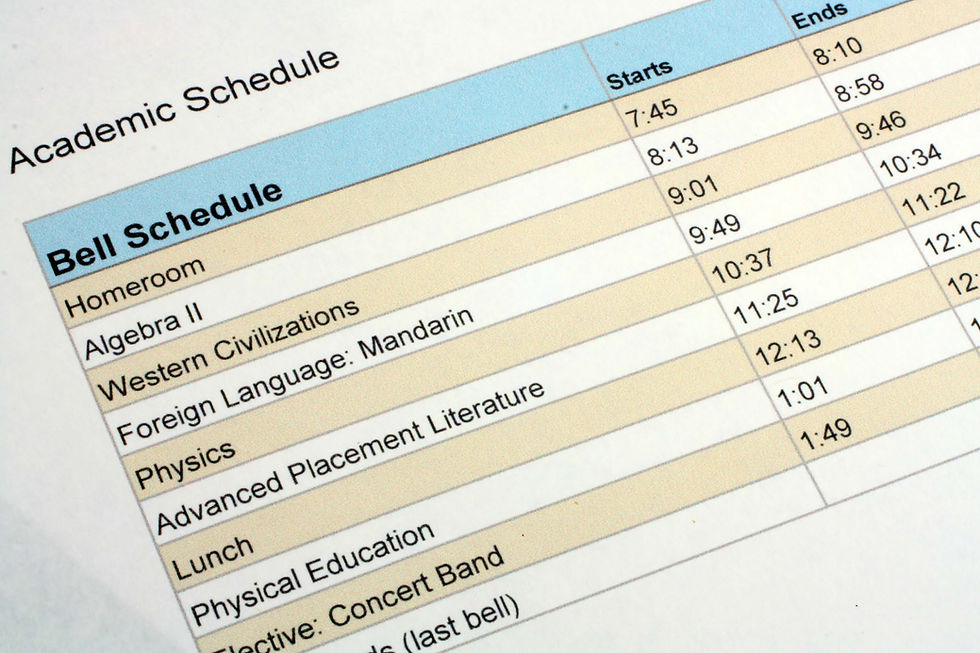Planning for Success: How High School Course Choices Impact College Admissions for Students with Disabilities
- Marie Guarnieri

- Mar 9, 2025
- 3 min read
High school course selection plays a critical role in college preparation, particularly for students with disabilities. Careful selection of math, science, and foreign language courses can significantly impact future academic opportunities. While course waivers might appear to be helpful accommodations, they can create unexpected challenges in college admissions and graduation pathways. Strategic course planning is essential to ensure students maintain their options for higher education and future career success.

Building a Strong Foundation: The Core Four Courses
A competitive college application is built on a solid academic foundation in English, Math, Science, and Social Studies. Whenever possible, students should aim to complete four years of each core subject to demonstrate academic rigor and preparedness.

The Role of Foreign Language
Foreign language courses play a critical role in college admissions. Many competitive institutions require at least two years of a single foreign language, with some recommending up to four years. While it may be tempting to seek a waiver, parents should carefully evaluate its impact on future college opportunities. Some colleges maintain foreign language graduation requirements regardless of a student's disability status, meaning a waiver granted in high school does not necessarily eliminate the requirement in college.

Science: A Key Component of College Readiness
Science courses also play a key role in preparing students for college success. Most colleges expect applicants to have completed at least three years of laboratory science, including biology, chemistry, and physics. While these courses may present challenges, they also foster essential critical thinking and problem-solving skills that will benefit students in any field.

Math: Foundational for Success
High school math classes play a crucial role in preparing students for college success and expanding their future opportunities. Most colleges expect applicants to have completed at least three years of mathematics, including Algebra I, Geometry, and Algebra II. Many competitive institutions prefer to see four years of math, often including more advanced courses like Pre-Calculus or Calculus. Taking these challenging math classes in high school not only strengthens a student's college application but also develops critical thinking and problem-solving skills that are valuable across various disciplines. For students considering STEM fields, a strong foundation in high school math is particularly important, as it prepares them for college-level courses in science, engineering, and advanced mathematics. Even for those not pursuing STEM majors, proficiency in math can be beneficial in fields such as economics, business, and social sciences. Parents and students should carefully consider the long-term implications of dropping math classes, as doing so may limit college options and future career paths.
The Impact of High School Waivers on College Admissions
Students with disabilities may receive waivers for math or foreign language courses due to learning challenges. However, these waivers do not automatically extend to college admissions or graduation requirements. Many colleges require applicants to have completed these courses, regardless of disability status. As a result, students who bypass them in high school may face limited college choices or additional coursework later on. Before accepting a waiver, families should carefully consider its potential consequences and discuss alternative strategies with educators and consultants.

College Requirements and Substitutions
Even if a student is admitted without meeting standard high school course requirements, they may still need to fulfill those requirements to graduate. Important points to keep in mind include:
Colleges are not required to provide course substitutions for students who received waivers in high school.
Some institutions may offer alternatives, but this is not guaranteed for all students.
Even if an admission requirement is waived, the same subject may be required for graduation.
Navigating High School Course Choices
While students with disabilities may face unique challenges, thoughtful course selection can help them navigate high school while keeping future opportunities open. Here are some key considerations for families:
Long-Term Impact: High school course selection affects not only college admissions but also future academic and career opportunities. Avoiding core subjects may limit choices down the road.
Course Balance: Collaborate with school counselors to create a balanced schedule that challenges students while providing appropriate support.
College Policies: Research target colleges’ specific requirements regarding math, foreign language, and other core subjects. Some institutions may offer alternatives or waivers, while others may not.
Support Services: Investigate the academic support services available at prospective colleges to ensure students can succeed in required coursework.
Final Thoughts
While high school waivers for math and foreign language may seem beneficial in the short term, they can create barriers to college admissions and graduation. Families should carefully consider what high school course choices are the most likely to set the student up for success and explore available support. By staying informed and proactive, students with disabilities can build a strong academic foundation that maximizes their college opportunities and future success.







Comments